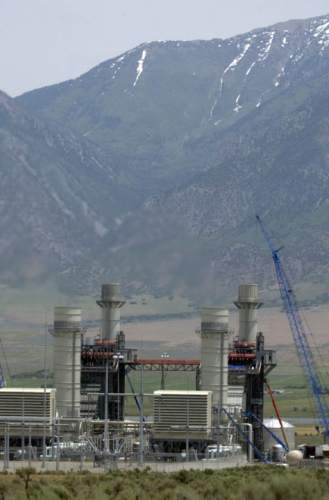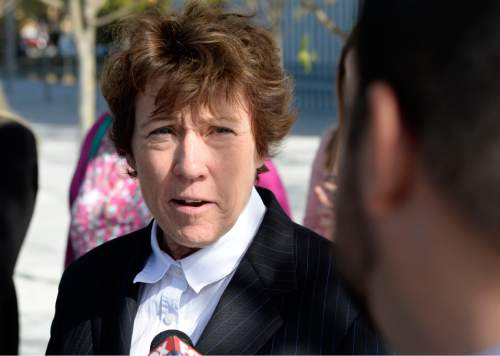This is an archived article that was published on sltrib.com in 2016, and information in the article may be outdated. It is provided only for personal research purposes and may not be reprinted.
Rocky Mountain Power's parent company will pay more than $122 million after the Utah Supreme Court ended an 11½-year-old lawsuit that alleged the utility stole trade secrets from a Texas company and used them as a model for its Currant Creek power plant near Mona.
The judgment, one of the largest in Utah history, will be paid out of shareholders' pockets and cannot be passed on to electricity customers.
"For my clients, it means vindication," Salt Lake City attorney Peggy Tomsic said of F. David Graeber and Theodore Banasiewicz, whose company USA Power was "destroyed" when Rocky Mountain Power cut it out of plans to build the natural-gas-fired plant.
"It puts an end to an injustice and allows them to have the proceeds they would have earned without the theft of their trade secrets," she said. "Now they can get on with their lives."
Unfortunately, Tomsic noted, it's too late for Banasiewicz, who died of cancer while the case worked its way up and down Utah's court system.
Rocky Mountain Power was disheartened but accepted the legal setback, said spokesman Dave Eskelsen.
"The events surrounding this case took place in the 2002-04 time frame, prior to the ownership of Berkshire Hathaway Energy," he said, referring to the holding company that includes Rocky Mountain Power and its parent company, PacifiCorp.
"The company is disappointed, but we respect the rule of law and will abide by the court's ruling," Eskelsen added, saying the payment would come from "noncustomer sources. … Judgments like that usually don't come out of rates."
The ruling handed down last week marked the second time the state Supreme Court weighed in on the case, which involved many prominent Utah attorneys.
Joining Tomsic in pursuing USA Power's case were James Magleby and Eric K. Schnibbe. Rocky Mountain Power's legal team was led by Peter Billings Jr. and Jim Jardine.
Former Utah Supreme Court Justice Michael Zimmerman and Thomas Karrenberg spearheaded the defense for Salt Lake City water rights attorney Jody Williams, who was accused of breaching her fiduciary duty by doing work for both USA Power and Rocky Mountain Power at the time.
According to the Supreme Court decision, Williams started working with USA Power in April 2001 to acquire water rights for a plant near Mona.
Graeber and Banasiewicz spent two years and close to $1 million developing their idea, figuring Rocky Mountain Power would buy the project from them or would let them build it and purchase their electricity.
Some of their research became public through filings USA Power made for a state air-quality permit and a zoning change in Juab County.
Not disclosed in those public materials were some crucial pieces of information — the cost of dry cooling the facility versus wet cooling, water usage, analyses of turbine performance, pricing of land and water options, and the cost of extending a Questar Gas pipeline to the plant. USA Power turned over that data to Rocky Mountain Power under a confidentiality and nondisclosure agreement.
"My clients had the vision," Tomsic said. "It's really the compilation of possible options for the optimum power plant in Mona, given the lack of water there and all the hundreds of alternatives for engines.
"They were the only company that had an air permit, they had the water available to do it, they had the land, they had designed the perfect combination of different components and were in a position to provide power at a time when there was a power crisis in Utah," she added.
By mid-March 2003, the two parties were on the verge of a purchase agreement when Rocky Mountain Power backed out, instead issuing a request for proposal (RFP) for bids for the project.
In doing so, the Supreme Court said, Rocky Mountain Power told USA Power that the RFP was its to lose "because it had done so much work on the project that nobody stood a chance to beat it."
One company did.
Four months later, PacifiCorp submitted its own bid and, in September 2003, opted to build the $341 million facility in-house.
That decision destroyed her clients' company, Tomsic said. "There was nothing left. They had put everything into this, a million dollars and they quit their jobs and devoted their lives to this. When Rocky Mountain Power misappropriated their trade secret, there was nothing left."
In February 2005, USA Power sued Rocky Mountain Power and Williams (for changing sides). Retired 3rd District Judge Tyrone Medley initially granted the defendants' request for summary judgment, but the Supreme Court overturned his dismissal of the case in 2010.
At a five-week trial in 2012, a jury awarded USA Power a $133 million judgment and found that Williams breached her fiduciary responsibility. The trial judge reduced the damages to $114.8 million and cleared Williams of blame, saying no evidence was presented proving her actions caused the ultimate outcome.
Both sides challenged different points in the ruling.
Last week, the Supreme Court put the matter to rest, affirming what came out of the 2012 trial — the $115 million in compensation, plus interest and attorney fees adding up to $122 million.
"This is certainly one of the largest [judgments] ever upheld by the Utah Supreme Court," said Colin King, a prominent Utah plaintiffs attorney. "It's probably the second highest."
(The largest was a judgment against an insurance company that the U.S. Supreme Court later reduced on appeal.)
Water-rights attorney Williams said she was relieved by the Utah high court's decision, which she emphasized was consistent with the rulings by both Medley and the 2012 trial judge. "I'm pleased that it's resolved — and this way," she said.
Her satisfaction did not come close to matching Tomsic's.
"I can tell you," Tomsic said, "it is so nice to see justice finally done."







